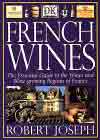|
French
Wines: The Essential Guide to the Wines and Wine Growing Regions of France
. If you want to buy it click on the picture

$17.05 only on Amazon store !!
|
Wine Glossary
- Acid/ Acidity :
Acids, primarly citric, malic and tartaric, occur naturally in wine
and, in the proper proportion, are essential ingredients, giving the
wine character and helping it age. As a rule, cool regions produce wines
that are hight in acidity, while warm regions produce wines that are
low in acidity
- Alcohol: The alcohol
present in wine, ranging from about 6.5 to 14 per cent.
- Appellation Contrôlée (AC
or AOC, French) Part of French law that guarantees that a wine comes
from where the label says it does, that it is made from specific grapes
and that it is produced in a certain way.
- Aroma: The smell
of a wine. As the wine matures and takes on more complex characteristics,
the term can change to "bouquet".
- Balance: Good balance
refers to a wine in which the acids, tannins, alcohol, fruit and flavour
are all in pleasing proportions.
- Barrique (French)
The regular Bordeaux oak barrel of 225 litres.
- Blanc (French)
White.
- Blending: A wine
can be blend of different varieties, different vintages, different areas
and even different barrel.
- Blind Tasting:
A tasting of wines where all clues as to the wines' identities including
the labels and shapes of the bottles are obscured from the tasters.
- Body: Term used
to describe the weight and the structure of a wine.
- Bouquet: The scent
of a wine that develops as it ages and matures.
- Brut: The term
given to a dry champagne.
- Cave (french):
Cellar.
- Cepage (French):
term for grape variety.
- Chambrer (French):
To allow a wine gradually to reach room temperature before drinking.
- Château (French):
Term given to a wine-growing property.
- Clos (French):
An enclosed vineyard, used particularly in alsace and Burgundy.
- Cru (french): A
growth or vineyard.
- Cru Classé (French):
A term which translates into English as "classed growth".
in 1855, 61 red wines of the Médoc (including one from graves: Chateau
haut-Brion) were classified as "cru classé", which were divided
inti five ranks determined by price (and therefore, in theory, quality),
ranging from "premier cru" (first growth) down to "cinquième
cru" (fifth growth). At the same time, the sweet white wines of
Sauternes were divided into three categories: "premier grand cru,
premier cru and deuxième cru", or first great growth, first growth
and second growth. Although now hopelessly outdated, these classifications
do still denote a lot of prestige to a property and its wines. In 1955,
also in Bordeaux, the wines of St-Emilion were similarly classified
into three ranks "premier grand cru classé, grand cru classé and
grand cru", while "grand cru classé (without subdivisions)
has also been used since 1953 for red wines of Graves and, since 1959,
for white wines of that area.
- Cru Bourgeois (french):
The term given to Médoc wines categorised just below those of cru classé
status.
- Cuvée (French)
A blended wine or a special selection.
- Domaine (French):
Property or estate.
- Doux (French) :
Sweet.
- En Primeur (french):
The system whereby each spring,following the vintage, the Chateaux of
bordeaux reveal the opening prices of their new wines. Customers pay
in advance for these wines through wine merchants and take delivery
of them after bottling some 18 months later. this method ensures that
customers get the wines that they want, and almost always at the most
advantageous prices. Prices rarely fall after the opening offer.
- Grand Cru (French)
: Term used for top-quality wines in Alsace, Bordeaux, Burgundy and
champagne.
- Label : It's everything
you need to know about a wine. most wine laws insist that labels reveal
the following: the wine's name, the size of the bottle, The wine's vintage,
The wine's alcoholic strength, The producer's name and address, The
wine's quality level.
- Mis en bouteille au château (French):
The wine was bottled at which it was made.
- Moelleux (French)
: Sweet.
- Mousse (French)
: The satisfying froth that fizzes in a glass of champagne or sparkling
wine as it is poured, savoured and drunk.
- Mousseux (french):
Sparkling.
- Pétillant (French):
Slightly sparkling.
- Récolte (French)
: Crop or vintage.
- Rouge (French):
Red.
- Sec (french): Dry.
- Sommelier (French):
A wine waiter.
- Terroir (french):
at its simplest, the worde means "soils", but winemakers use
it to refer to the differing types of soil, climate, drainage and position
of a vineyard.
- Varietal: a wine
named after the grape from which it is made.
- Vendange (French)
The harvest or vintage.
- Vendage Tardive
(french) : late harvest.
- Vigneron (French):
Vine grower.
- Vin de pays (french)
: country wine of a level higher than table wine.
- Vin de table (French)
: Table wine. Law quality wine.
- Vin doux naturel (french)
A fortified sweet wine.
- Vin ordinaire (French):
Basic wine not subject to any regulations.
- Vinification: The
process of making wine.
- Viticulture: The
cultivation of grapes.
|